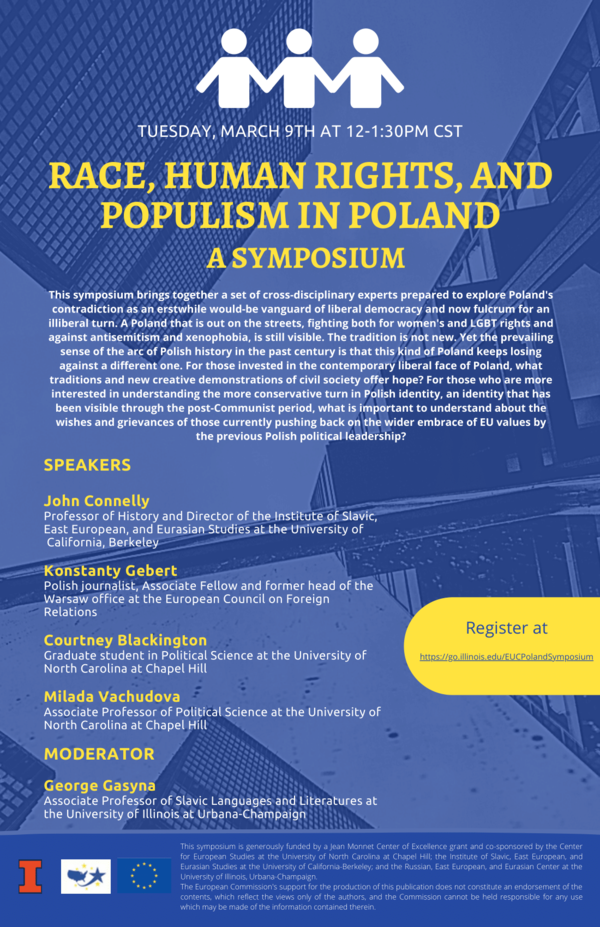Race, Human Rights, and Populism in Poland: A Symposium

- Sponsor
- European Union Center at the University of Illinois, Urbana-Champaign; Center for European Studies at the University of North Carolina at Chapel Hill; Institute of Slavic, East European, and Eurasian Studies at the University of California, Berkeley; Russian, East European, and Eurasian Center at the University of Illinois, Urbana-Champaign
- Registration
- Registration
- eucenter@illinois.edu
- Views
- 465
In the past thirty years, Poland has been taken as a bellwether for the political direction of East Central Europe. A country whose Solidarity movement, roundtable about a peaceful transition to multi-party rule, and elections in June 1989 helped end decades of Communist rule in the region, it was heralded as one of a small number of countries at the vanguard of an imagined inevitable transition to liberal democracy and a market economy. Indeed, Poland was part of the first wave of post-Communist countries to join the EU, and Poles quickly made themselves present in EU institutions (e.g. Donald Tusk) and the public life of some old member states (especially the UK). Today, however, Poland is being repeatedly rebuked (along with one-time democratic partner in the vanguard, Hungary) for violations of the generally liberal rule of law that define EU democratic norms. This different side of Poland must be explained at least in part with a historical, journalistic/activist, and political view of the ways in which populists have exploited the politics of difference, particularly regarding race, and leveraged deeper cultural ambivalences about pan-European ideas about human rights.
This symposium brings together a set of cross-disciplinary experts prepared to explore this contradiction in Poland as an erstwhile would-be vanguard of liberal democracy and now fulcrum for an illiberal turn. A Poland that is out on the streets, fighting both for women's and LGBT rights and against antisemitism and xenophobia, is still visible. The tradition is not new. Yet the prevailing sense of the arc of Polish history in the past century is that this kind of Poland keeps losing against a different one. For those invested in the contemporary liberal face of Poland, what traditions and new creative demonstrations of civil society offer hope? For those who are more interested in understanding the more conservative turn in Polish identity, an identity that has been visible through the post-Communist period, what is important to understand about the wishes and grievances of those currently pushing back on the wider embrace of EU values by the previous Polish political leadership?
Register here. Please see here for a library research guide on Polish studies.
Moderator:
George Gasyna, Associate Professor of Slavic Languages and Literature, University of Illinois, Urbana-Champaign
Panelists:
John Connelly, Professor of History, University of California at Berkeley
Konstanty Gebert, Journalist and Activist
Milada Vachudova, Associate Professor of Political Science, University of North Carolina at Chapel Hill
Courtney Blackington, PhD Student in Comparative Politics, University of North Carolina at Chapel Hill
This symposium is generously funded by a Jean Monnet Center of Excellence grant and co-sponsored by the Center for European Studies at the University of North Carolina at Chapel Hill; the Institute of Slavic, East European, and Eurasian Studies at the University of California, Berkeley; and the Russian, East European, and Eurasian Center at the University of Illinois, Urbana-Champaign.